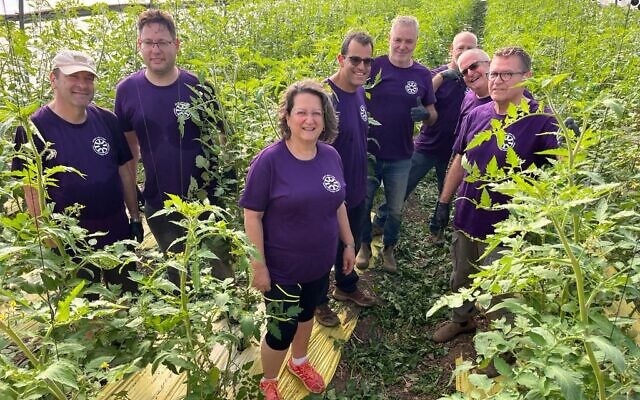Israelis are Volunteering More than Before the War
A Hebrew University survey indicated a major shift in volunteer activity.

As International Volunteer Day was celebrated Dec. 5 to “recognize and celebrate the work and efforts of volunteers around the world,” a number of members of the Atlanta Jewish community were preparing for their missions to Israel to fill any vacancies created by the fleeing of foreign workers from Israel or the huge call-up of army reservists needed for the war against Hamas.
In December alone, the Jewish National Fund has three separate volunteer opportunities for American Jews to sign up for. The four-day trips will allow the volunteers to pick vegetables and other crops on Israeli farms or take on logistical roles on an army base to fill the void of some 350,000 Israelis now serving in the Israel Defense Forces or as reservists.
Atlantan Robin Feldman said she joined the JNF Atlanta board last year and was so “moved by the impressive work they do in support of Israel,” that she signed up for one of the December missions. “Given the opportunity to support the resilience efforts financially and also volunteer there (tikkun olam) seems like the right thing to do, especially at this time.”
Of course, JNF isn’t the only Jewish organization offering volunteer missions to Israel.
And, according to research conducted by Hebrew University in Jerusalem, there has been a “significant shift” in the nature of volunteering among Israelis since Oct. 7 when thousands of Hamas terrorists and their allies breached Israel’s defenses along the Gaza border and tortured and murdered at least 1,200 people, injured thousands and kidnapped some 240 as hostages, most of which are still held somewhere in Gaza.

The surveys were conducted by the Institute for the Study of Civil Society and Philanthropy in Israel at Hebrew University, in collaboration with the Israeli Volunteering Council and the Ministry of Welfare and Social Services. Most significantly, the surveys disclosed an extraordinarily high rate of volunteering among Israelis.
Almost every second Israeli citizen volunteered during the war, including 49 percent among the Jewish population and 28 percent among the Arab population. This was considered a higher rate than during previous crises, such as during the COVID-19 pandemic, when 20.3 percent of the Israeli population reported volunteering.
“During this tumultuous time, the surge in volunteering reflects a powerful testament to the resilience and unity of Israeli society,” said Professor Michal Almog-Bar, head of the Institute for the Study of Civil Society and Philanthropy at Hebrew University. “The emergence of diverse volunteering patterns underscores our ability to adapt and collaborate, highlighting the crucial role each individual plays in shaping a stronger, more cohesive community.”
According to the surveys, a “noteworthy proportion of volunteers (25 percent) are identified as ‘spontaneous volunteers,’ previously unengaged individuals who have stepped up during the conflict. This surge in participation marks a departure from routine volunteering trends, with only 20 percent having a history of regular volunteering.”
The surveys also noted that the majority of volunteers are from secular backgrounds (49 percent), surpassing traditional and religious segments. Prior to the war, volunteering rates among the religious and ultra-Orthodox population were higher than volunteering among the secular population. Moreover, a significant number reported above-average incomes, reflecting diverse economic backgrounds among the volunteers.
Unlike during the pandemic, the current volunteering spans across age groups, with notable engagement from older demographics. The volunteering has also broadened – out of necessity. The volunteers have engaged in both traditional and new realms of volunteering, such as aiding in agriculture, public relations efforts on social media, assisting security forces, and supporting vulnerable populations.
Notably, since the war started, entire communities along the Gaza border as well as along the Israeli border with Lebanon have been evacuated to safer areas such as the Dead Sea and in Eilat. Displaced from their homes – some of which no longer exist – these populations have needed various support including psychological, emotional, and material since many evacuated with only the clothes on their backs and no money.
And the survey addressed that as well. “Volunteers have shown a trend of combining hands-on activities with financial (53 percent of the volunteers) and in-kind contributions (78 percent of the volunteers), fostering a more integrated approach to support causes associated with the war.”
Unlike during the pandemic, the current volunteering spans across age groups, with notable engagement from older demographics. The volunteering has also broadened – out of necessity. The volunteers have engaged in both traditional and new realms of volunteering, such as aiding in agriculture, public relations efforts on social media, assisting security forces, and supporting vulnerable populations.
Most of the volunteering has occurred close to home, with 69 percent having engaged in activities within their local communities.
Perhaps not surprisingly in the Start-up Nation, social media platforms and digital organizing, including WhatsApp groups, have played a pivotal role in recruiting, training and coordinating volunteers, showcasing a shift towards tech-centric volunteering methodologies.
While the Israeli government struggled to react both militarily and supportively to its population in the wake of the Hamas attack, more than 1,000 civilian initiatives sprung up across Israel, demonstrating rapid organization and engagement from diverse societal segments, including the ultra-Orthodox and Arab populations.
In addition to helping their fellow citizens, volunteers expressed high rates of satisfaction and relief through their engagements and a strong intent to continue volunteering post-war.
But that continuing effort faces challenges, according to Almog-Bar, including the need for professional oversight, support for volunteers facing secondary traumatization and preventing volunteer burnout. She emphasized the importance of ensuring proper training for volunteers, preventing exploitation and the need for effective coordination to maximize the impact of volunteering efforts.



comments